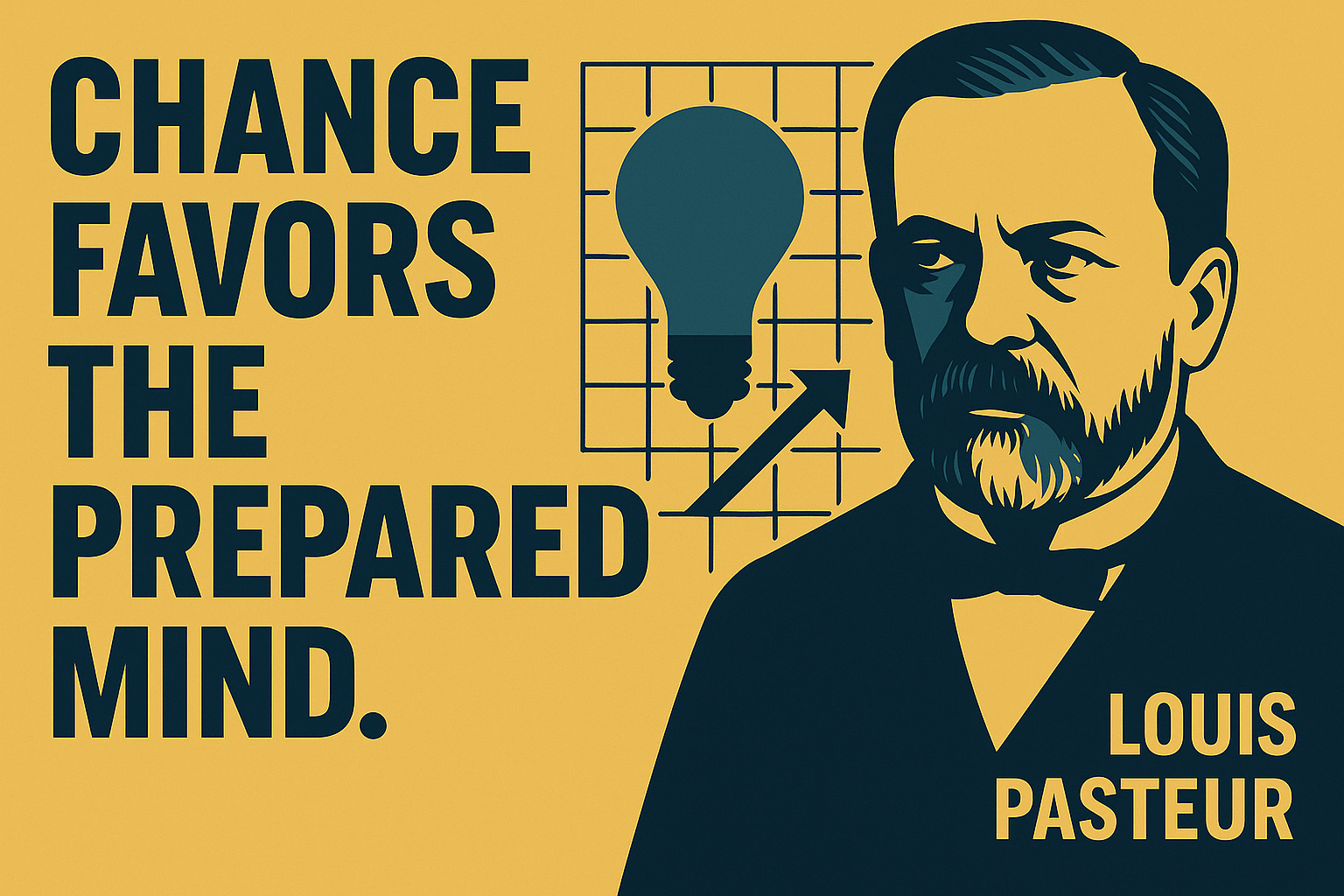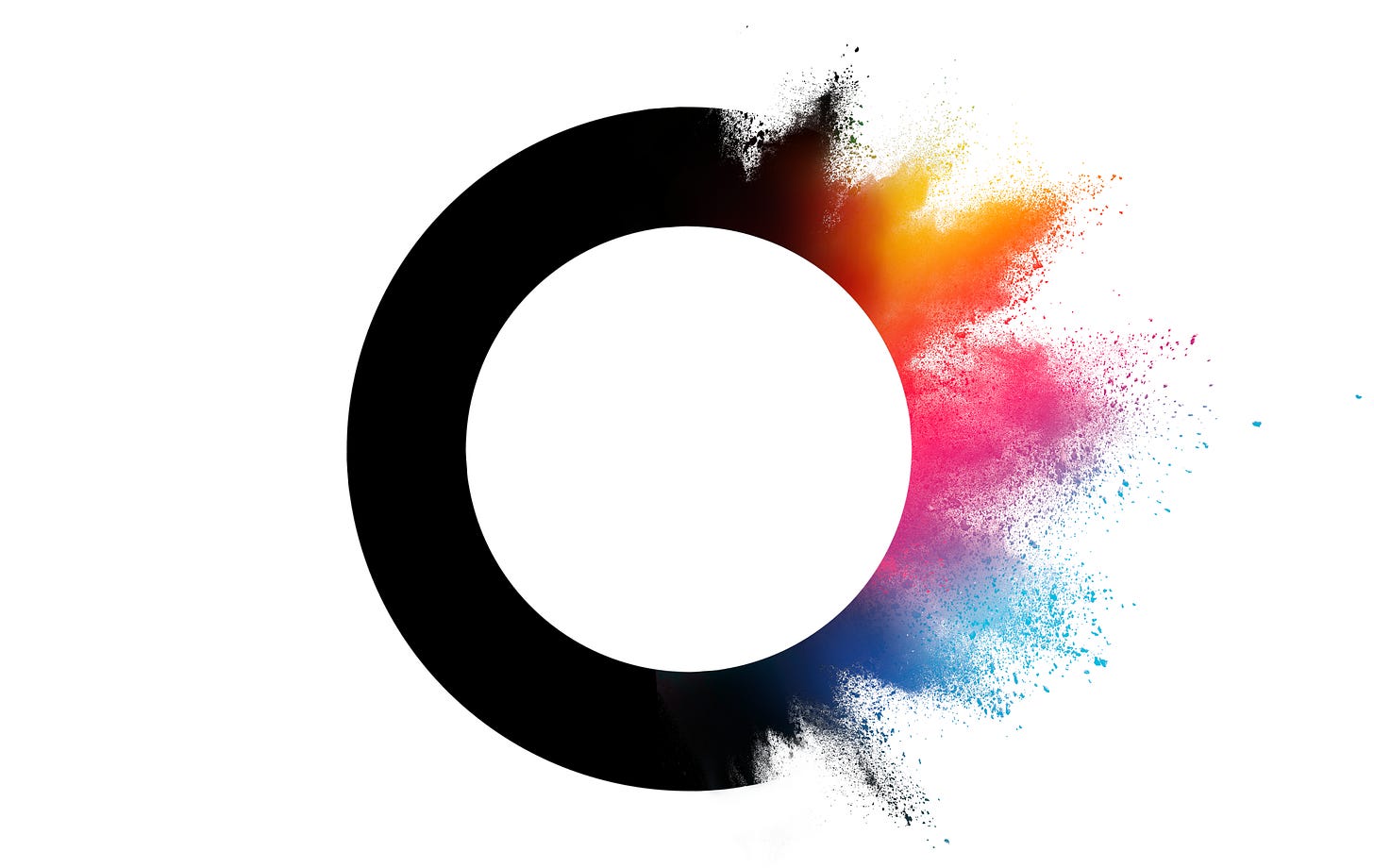Luck is not an accident
Why chance (and insights) favor the prepared mind
The Pattern Breakers book is now available wherever you buy your books.
In this piece, I will explore what we can learn about insights from legendary pattern breaker, Louis Pasteur.
His contributions to science and human health are profound. Moreover, his mindset serves as a guide for entrepreneurs seeking breakthrough insights.
Lessons include:
Why Pasteur’s secret weapon was a “prepared mind.”
How Pattern Breakers cultivate the right mindset instead of confining themselves to following recipes or methodologies.
Why prepared minds attract luck.
How to cultivate a prepared mind.
It’s a seven-minute read. I hope it serves you well. Let me know your thoughts.
“Chance favors the prepared mind”
I've always been obsessed with learning about the beginnings of extraordinary startups. Listening to founders share their early moments of discovery reminds me of a favorite quote by Louis Pasteur: "Chance favors the prepared mind."
Louis Pasteur (1822-1895) was a French chemist and microbiologist. He developed the first vaccines for rabies and anthrax. He also introduced "pasteurization," a method of heating liquids to eliminate pathogens. Through direct experiments, he demonstrated that diseases are caused by microorganisms and made huge contributions to the germ theory of disease.
Like most pattern-breakers, Pasteur met skepticism and criticism. Some around him, and later some historians, thought his discoveries were just luck, or stumbled upon by chance rather than method. In science, discoveries that seem accidental are not uncommon, and Pasteur appeared to experience these especially often. However, what may appear as luck is typically the outcome of keen observation and careful interpretation of a chance event.
Much of Pasteur's genius lay in a mindset that attracted luck, a mindset he fully embraced.
Being ready and alert and in the right place is crucial for grabbing opportunities when they come, especially in science and innovation. True insight often comes from an accident or an unexpected observation. But the chance event itself isn’t enough; unexpected things are always happening. They only turn into breakthrough discoveries when the right person observes them. And that right person needs to have a prepared mind. A prepared mind is trained and awake, built on a solid foundation of knowledge, curiosity, and a readiness to question and explore. Ultimately, the prepared mind is a type of mindset - one that is best equipped to turn chance findings into meaningful discoveries.
Towards the end, the rest of this post is focused on how you can cultivate this type of mindset.
Pattern-breaking founders hunt for insights with a prepared mind, not a formula
Pasteur's statement applies to creative fields beyond science, from business to the arts, where a well-prepared mind is more likely to recognize and take advantage of opportunities that might otherwise go unnoticed.
There is no recipe for a breakthrough. When you think about it, there can’t be a recipe. Recipes only work for things that have already been discovered.
Preparing your mind for a chance event might seem counterintuitive and unsettling. The path is indirect. The next steps are unclear. People who try to plot a direct path to startup success treat the task on par with answering questions in school. They fall into familiar patterns of thinking about a problem, which leads them to generate conventional ideas. While these ideas might be correct in the sense that they would earn full credit in school, they are typically consensus-oriented and unlikely to lead to outlier success.
There’s a big connection between prepared minds, and my previous post about living in the future, which is all about embracing the uncertainty of the future and spending time with specific types of technology as well as specific types of people. Doing this radically improves the odds of encountering a chance event that leads to something extraordinary. It’s part of how you prepare your mind.
Luck Visits Prepared Minds More Often
Pasteur understood that some people get lucky more often than others because they do more smart things to attract luck.
What does it mean to attract luck? Is it hard? Why wouldn’t we all do it?
For years, I was fascinated by the connection between the right mindset and the kind of luck that leads to breakthroughs. I found a lot of answers in the book “Chase, Chance, and Creativity: The Lucky Art of Novelty" by James H. Austin.
Austin, a clinical neurologist and researcher, examines how luck plays a role in scientific discovery and artistic innovation. He argues that chance events leading to new insights and breakthroughs aren't just accidents; instead, they can be fostered through specific behaviors and mindsets.
Austin describes four kinds of luck, and how to use them:
Blind Luck: Pure chance that cannot be controlled or predicted.
Luck from Hustle: Luck that arises from hard work, persistence, and lots of attempts.
Luck from Serendipity: Seeing and connecting what others miss, often leading to surprises.
Luck from Preparedness: The result of thorough preparation and knowledge, which allows one to recognize and seize opportunities.
Austin says that while we can't control blind luck, we can cultivate the other three types. He argues that being open to new experiences, curious, diligent, and prepared can boost your chances of finding serendipitous and preparedness-induced luck. He uses examples from science, art, and his own life to show how chance, mixed with creativity and hard work, can lead to major innovations and discoveries.
Austin shows that many people fail to attract as much luck as they might because they choose safer, well-worn paths—those that follow a formula, recipe, methodology, or gain the approval of others. These choices may feel secure, but their inherent limitations often keep luck at bay.
Ultimately, "Chase, Chance, and Creativity" is less about luck and more a guide on how to lead a more innovative and productive life by acknowledging and harnessing chance in creativity. Austin pushes readers to develop a mindset that is open to chance encounters and ready to act on them, boosting their capacity for creativity and discovery.
Ultimately, we are all visited by luck more often than we realize. The key to making the most of it is being in the right places to be visited by it in the first place (by living in the future) and by complementing rigorous preparation and knowledge with a constant openness to noticing the positive surprises that visit you along the way. When you are on the verge of being visited by the muse, you have to be awake to the possibility of a chance encounter.
How can we prepare our minds to attract more luck?
Living in the future is one way. We discussed this in our last post.
Louis Pasteur’s career and James Austin's frameworks suggest additional ways to attract insights and luck.
Create more luck from targeted hustle. Each day, challenge yourself by asking, “What more can I do today to be in the optimal place, at the optimal time, with the right mindset?” Even small, consistent efforts in this direction compound, increasing your exposure to innovative ideas.
Create more luck from serendipity. Unexpected observations, when paired with a curious and observant mindset, can lead to significant discoveries and innovations. A great technique for harnessing luck from the unexpected is to regularly ask yourself, "What surprised me today?" in every project you undertake. Cultivating a habit of embracing surprises can greatly enhance your ability to notice anomalies instead of merely operating on autopilot based on preconceived notions.
Create more luck from preparation. Plunge into a subject that grips you, one that's ambitiously exciting, regardless of how trivial it may seem to others. Learn it thoroughly, until you stand at the frontier of its knowledge. From there, you'll find that the edges, seemingly smooth from a distance, are in truth jagged and cluttered with uncharted areas and compelling, unanswered questions. Search for the gaps others have overlooked, particularly in new fields, and probe these promising zones. Embrace the quirks of these journeys, driven by curiosity and the desire to do something remarkable. Hard work and true passion are indispensable here.
I am always searching for new examples that show how insights link with serendipity, and how certain mindsets and actions seem to draw luck more than others. Tell me what you think, whether this strikes a chord with you or not.
In the meantime, Good Luck!








Great post Mike, I’d add that the knowledge you have must be diverse enough to provide a sufficiently wide aperture with which to see details no one else can - let in more of that luck you might say. And in my opinion, luck from serendipity and preparation are intrinsically tied. The latter allows one to to see and then act on the former. It’s this optimistic skepticism (questioning & exploring as you said) that sets apart the pattern breakers from the followers - all the knowledge in the world won't help if you don’t look at everything and think “what if I did…” and then go down that rabbit hole much further than any sane person would.
This is one of my favorite posts so far in the pattern breakers series,and I liked the others.
Here are some thoughts:
*Don’t ignore your gut.Patterns are first identified by our subconscious mind and attempting to enforce rigor too soon might cloud the insight.
*Don’t over schedule. Reserve time for long walks during which reflection is more likely to surface something outside the norm.
*Deep expertise might be useful but keep the humility of a beginner’s mind and bring connections and analogies from other fields.